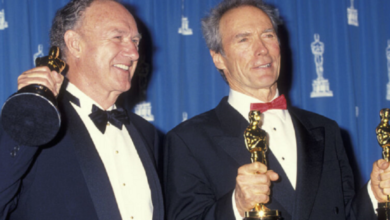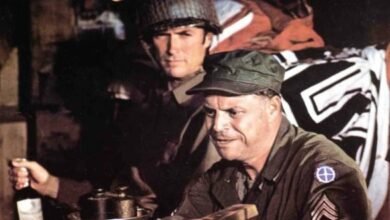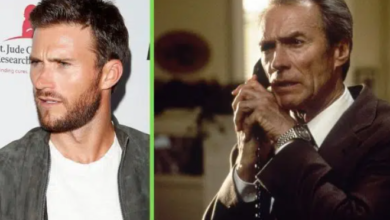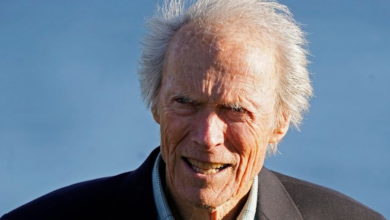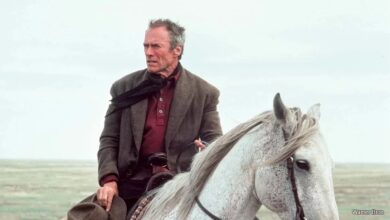Joe Kidd: John Sturges and Elmore Leonard crafted a lean, mean Western for Clint Eastwood
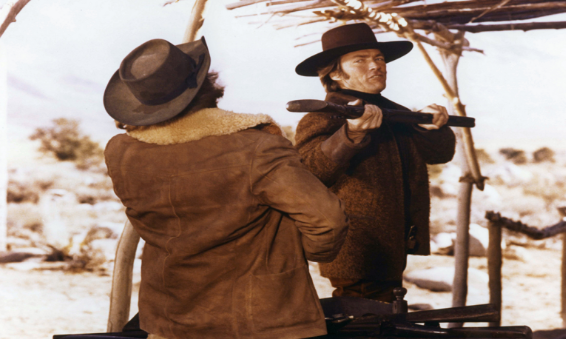
Joe Kidd(1972), starring Clint Eastwood in the title role was a Western directed by John Sturges and written by Elmore Leonard. It featured Robert Duvall and John Saxon in supporting roles
Elmore Leonard , the revered American novelist and short story writer, is today known more for his crime fiction and suspense thrillers laced with dollops of humor and great dialogue. A lot of them – like Get Shorty and Out of Sight – has been adapted into very popular movies. But he started out as a writer of gritty Westerns in the 1950s. His most famous work being 3:10 to Yuma, which was made into a movie by director Delmer Daves, starring Glenn Ford and Van Heflin. His other novels that were adapted into movies include Paul Newman starrer Hombre and Randolph Scott starrer The Tall T. So it was natural that he would team up with the ultimate western icon, Clint Eastwood, for a film. But it was not going to be an adaptation of any of his novels, Leonard would right an original script for Clint. It was Joe Kidd(1972), directed by Western veteran john Sturges(The Magnificent Seven, The Great Escape). With such a great pedigree – of Eastwood, Leonard and Sturges – and a great supporting cast – which include actors like Robert Duvall and John Saxon- one would have expected the film to turn out to be as iconic and popular as any of the famous westerns that Eastwood or Sturges had made individually in their lifetime. But Joe Kidd is quite an obscure entry in their respective filmographies. It’s hardly ever mentioned except by die hard fans, which is a pity really, because even though the film doesn’t break any new ground vis-à-vis the genre, characterization or performances , on it’s own it’s a great star vehicle that shows off the legendary Eastwood persona and his star charisma to the fullest. Clint was entering a golden period in his career, especially after the massive success of Dirty Harry that made him perhaps the biggest movie star of that time. He had evolved a lot, as a star and as an actor, from the Rawhide\Spaghetti western days, and it works well for this film.

The plot of the film is set in Leonard’s favorite New Mexico Territory, which has been the location of many of his westerns. And in keeping with the times this is a revisionist western: which casts the natives in a sympathetic light in their battle for land against encroachment by the white settlers. The film is set in Sinola town, New Mexico in the early 1900’s- that’s before New Mexico became a state in the union. Mexican revolutionary Luis Chama(John Saxon) has been leading a peasant revolt against the white authority . The peasants have been systematically robbed of their ancestral land by wealthy, white landowners. As all peaceful means of redressing their grievances fail, Chama and his gang take the law into their own hands. He stirs up the native Mexican population with his passionate calls for land reforms and then starts cutting fences and reclaiming lands. Finally, they raid the court house and burn deeds to their lands, now under the name of some wealthy landowners. The gang releases several of their members from jail and escapes into the mountains. In comes Frank Harlan(Robert Duvall) to town, with his girl Elma and a gang of sharpshooters that include Lamarr Simms(Don Stroud) and Olin Mingo(James Wainwright). Harlan is a wealthy landowner who has claims to about 600,000 acres in the territory and is most affected by Chama’s rebellious activities. Since he doesn’t have the time or inclination to fight out his claims in the court, he choose to follow Joseph Stalin’s theory: that the best way to eliminate a problem is to eliminate the man, No man , no problem. Once Chama is taken care of , the rebellion will be crushed. After that no more trouble from the natives or any more talk of land reforms. Though comrade Stalin had intended it to be applied for the success of the revolution, history has proved that the theory could be beneficial for everyone; communists, capitalists, revolutionaries, counter-revolutionaries, doesn’t matter who. And to this end, Harlan and his associates are equipped with the most modern rifles that have a much greater range than previous types. But to hunt down Chama, he needs an expert tracker who knows the territory like the back of his hand .

Enter our hero (or rather the anti-hero) Joe Kidd(Clint Eastwood). Kidd has been many things in the past and his history reads more like the description of the roles played by Eastwood in his previous films. Kidd started out as a bounty hunter, then he became a frontier tracker, and then a deliverer of supplies to the Apache reservation. What he does now is rather ambiguous. He is some kind of an outlaw; when we first see him , he is in jail handcuffed to bed. But he is tastefully dressed as a town dude(as Elma describes him later), in a suit and tie. He is brutally hungover and has a hard time getting up when Sheriff Mitchell(Gregory Walcott) comes to take him to court. In jail, his fellow inmates are Naco and Ramon, both members of the Chama gang. Naco repeatedly taunts Kidd, which Kidd ignores at first, but when he finally gets up to go to court , he pours the bowl of soup down Naco’s head and beats him up; All of this carried out in his inimitable cool, laconic, darkly comical style by Eastwood. Kidd has been locked up on the charges of poaching and behaving disorderly. He hunted and killed a deer on the reservation and when he was arrested for the crime by the Sheriff, he threatened to urinate all over the courthouse. The judge(John Carter) is amused and outraged by Kidd’s actions. He offers him a choice of 10 days in jail or $10 fine as punishment. Kidd, who is in a mood to irritate the Sheriff who had punched him earlier, takes the 10 days. But the Sheriff promises him that he isn’t going to get any free meals and he intends to work Kidd to his bone for 10 days.

It is at this precise moment that Chama and his gang raid the courthouse. They handcuff the Sheriff and burn the documents. That’s not all, they intend to kidnap the judge and take him with them. But the timely intervention of Kidd saves the judge and he manages to escape. Kidd goes into the saloon and gets a rifle loaded and ready as he is sure that Naco would come looking for him. And sure enough, once the gang raids the jail and releases the prisoners , Naco comes straight to confront Kidd. But seeing Kidd ready and waiting, he demurs and indulge in some casual talk, as Kidd coolly gulps down a glass of beer . Naco bids adieu and walks out of the saloon, but immediately, returns with his gun blazing. But Kidd is prepared and he fires the rifle without even looking back at Naco; that cool , nonchalant Eastwood style again. Naco falls dead right in front of Chama and he notices Kidd, who acknowledges him by lifting his beer glass. The gang shoots up everything they see in sight before making their escape into mountains. The Sheriff , who has managed to break his shackles, now round up a posse to go after the bandits. The townsfolk request Kidd join them in tracking down Chama, but Kidd refuses saying that ‘He’s got nothing against Chama‘ . The posse rides off without Kidd and they are unsuccessful in nabbing Chama. So a reward is announced for any information that leads to the capture of Chama and his gang.

It is in this context that Harlan and his men are arriving in town. The town judge, who was saved by Kidd and who’s a friend of Harlan’s, recommended Joe Kidd highly. Harlan pays Kidd’s $10 fine and gets him released from Jail. Now Harlan makes Kidd an offer of $500 to help them hunt down Chama. Kidd once again refuses; apart from the reason he already mentioned, there is now an additional one: Harlan’s girl Elma has taken quite a shine to him and he knows that with Harlan out of town hunting with his gang, Elma is going to be all his. He promises Elma that he is going to be back soon and he rides out into the country where he has a farm. But when he reaches his place, he finds it deserted. Luis Chama has raided the place with his gang and stolen his horses. They have dragged Kidd’s servant Emilio up the mountains and tied him up with barbwire; all as a retaliation for Kidd killing Naco. Now an enraged Kidd wants some payback of his own, so he decides to take up Harlan’s offer. He rides back to town, all armed and dressed up, to go hunting; his light suit giving way to dark jacket. On his way up to meet Harlan, he is interrupted by Lamarr, who in turn feels the full force of Kidd’s fury. Kidd grabs hold of Lamarr’s belt and pull him down the staircase. Kidd meets Harlan and tell him that for a $1000 , he will help him track down Chama. Harlan agrees. On his way out of his room, he is confronted by an angry Lamarr with his gun in his hand. Lamarr issues a threat that the moment Kidd becomes useless to Harlan, Lamarr is going to kill him.

Kidd, Harlan and his gang set off into the wilderness looking for Chama. But pretty soon Kidd would realize that he is batting for the wrong team. First ,Harlan’s gang cold-bloodedly murders a few members of Chama gang after they refuse to give away Chama’s hideout. Next , the gang barges into the house of Chama’s lover Helen Sanchez(Stella Garcia) and holds her hostage for the night. Then they drag her along on the journey; all this to the utter disapproval of Kidd. Finally, they reach Chama’s village and they realize that Chama is hiding in the nearby hills. Harlan move all the villagers into the church. He then sends out a message that if Chama doesn’t come down by sunup next morning he will execute five of the villagers. Harlan no longer trusts Kidd. He fires Kidd from his role as a tracker, disarms him and throws him into the church with the others. But before he could go into church , Kidd is challenged by Lamarr , who wants to exact revenge. In the ensuing standoff, Lamarr gets knocked out cold by Kidd.

Next morning, everybody is waiting for Chama’s arrival, but there is no sign of him. Meanwhile, the priest steals a gun and gives it to Kidd. Kidd manages to kill Lamarr , who is standing watch on the church tower. and then manages to escape unnoticed with Helen. And just as Harlan is about to execute the 5 villagers , Kidd attacks the gang with Lamarr’s gun and then rides of into the mountains with Helen to confront Chama. Helen is disgusted that Chama did not come down to save the villagers, but Chama reasons that if he dies then the revolution will be dead and 5 villagers have to be sacrificed for a higher cause. Kidd convinces him that there is another way. Chama should give himself up and argue his case in court. Chama agrees to return to town with Kidd for standing trial. Kidd informs Harlan and his gang that he will deliver Chama to Sheriff Mitchell in town. So Harlan decides to hurry back to town and take out Chama before he surrenders. Kidd and Chama return to Sinola only to realize that Harlan has the town under his control and the Sheriff is in cahoots with him. To get to the jailhouse, Kidd drives a steam train through the town saloon. A gunfight ensues between Kidd and Harlan’s men, in which Kidd emerges triumphant. The manner in which Kidd finally shoots down Harlan is very interesting. It’s a sort of nod to Clint’s affinity for playing judge , jury and executioner in his films; the vigilante cop movie Dirty Harry was released just the previous year. The final duel takes place in the courthouse and in an ironic turn of events, Kidd hides out in the judge’s chair. Just when Harlan feels that he is safe and drops his guard, Kidd turns around in the chair and shoots him down. Chama then surrenders to Mitchell. Kidd punches the sheriff and knocks him out cold ; Payback for punching him during the poaching arrest and for colluding with Harlan. He then collects his things and ride out of town with Helen.

First things first: Joe Kidd doesn’t really stack up to films like The Good, the Bad and the Ugly, Outlaw Josey Wales, Unforgiven or even High Plains Drifter. But it’s still a prime example of a well-made, by the numbers, meat and potatoes Western with a perfectly tailored role for Eastwood; a deadpan, scowling, squinting badass with a dry sense of humor. He looks great , moves great and talk just enough; more comfortable letting his silences, squint and attitude do the talking . Elmore Leonard has crafted a lean, clean and straightforward narrative, which does not pose any strong moral questions or indulge in ideological debates, even though there was a lot of scope for that in the script. I have a feeling that both the script and the film was heavily edited down after Clint came on board. The film runs a crisp 87 minutes and is pretty much well paced for most of it’s running time. Which means that the film does not have the expansiveness, depth and scale of other John Sturges’ westerns like Hour of the Gun or The Magnificent Seven. Sturges was coming off a bad experience directing Steve McQueen in Les Mans(1971). He had quit the film midway as he couldn’t get along with McQueen . By some accounts , the same thing happened with Clint also on this film. Their relationship was acrimonious, with Clint, now a director himself and also one of the most powerful superstars in the industry, asserting himself in the making of the film. But Sturges still manages to leave his imprints on the film with his trademark widescreen compositions; and the film is magnificently photographed by Bruce Surtees, who puts the resplendent California landscape to good use. The film boasts of a great soundtrack by Eastwood regular Lalo Schifrin. All in all, a must for all Eastwood fans.

